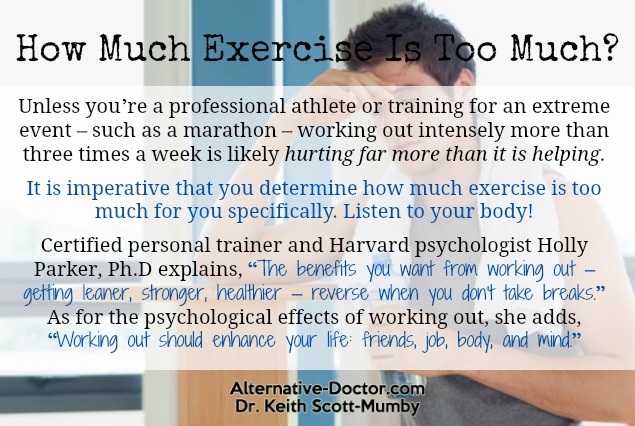The majority of the population doesn’t get enough healthy exercise. Coupled with the Western diet of high-refined starch, high sugars, and chemical additives, the result is an increase in your risk of heart disease, obesity, and diabetes… among others.
Then there is the other side of the coin. Some people take working out to extremes, pushing their bodies through high-intensity regimens or working out almost constantly. The result is an increase in your risk of high blood pressure, weight gain, inflammation, mood swings, extreme fatigue, and a compromised immune system.
Exercise – like anything else – is fantastic if done safely and within reason.
Every time you work out, your muscles develop tiny tears, oxidative damage occurs at the cellular level, and your heart is put under stress as your heart rate rises.
This is normal and expected. As long as you allow your body to recover, these issues naturally repair themselves.
However, if you push yourself through intense workouts day after day, your body never gets a break. It is given no time to recover and over time, this will influence your results.
To know how much exercise is too much, you have to evaluate why you exercise, determine your personal goals, and accept that your body needs rest in order to meet those goals safely.
Damage to thigh muscles from over-exercising is one way to predict early death.
There is a growing percentage of people who are crossing into addiction territory when it comes to exercise. Any activity – even a positive one – can turn into a negative one if taken too far.

8 Signs You May Be Taking Exercise Too Far
- You aren’t seeing the results you once did.
- You hit a “plateau” in weight loss goals or experience unexpected weight gain.
- You experience feelings of guilt or self-loathing if you don’t exercise.
- You experience bouts of extreme fatigue and muscle soreness.
- You exercise while sick.
- You plan all areas of your life around a rigid workout schedule.
- You become sick more often or it seems harder to shake illness.
- You experience mood swings that may include depression, anxiety, or anger.
The demands in our modern world for exterior perfection are everywhere we look. The pressure can be intense to push yourself beyond what your body can handle. There is a mentality of “if this much is good then this much more is better.”
Just as with alcohol or medications, that logic is flawed and can leave your body wrecked.
Unless you’re a professional athlete or training for an extreme event – such as a marathon – working out intensely more than three times a week is likely hurting far more than it is helping.
It is imperative that you determine how much exercise is too much for you specifically. Listen to your body!
Certified personal trainer and Harvard psychologist Holly Parker, Ph.D explains, “The benefits you want from working out – getting leaner, stronger, healthier – reverse when you don’t take breaks.” As for the psychological effects of working out, she adds, “Working out should enhance your life: friends, job, body, and mind.”
3 Tips for Working Out Within Reason
- Let your body rest! This doesn’t mean you have to spend the day on the couch but consider walking an art museum, taking in an outdoor fair, or going for a casual walk with your dog or loved one? Let your cells recuperate at least three times a week and you’ll see the results in the gym and on your body.
- Reevaluate your current exercise routine! You need to know why you’re working out to get the best results. Are there other aspects of your health that you can focus on – such as diet – that might give you quality results without pushing yourself so hard physically?
- Remember that there is more to life than working out! If you’ve been neglecting other areas of your life to hit the gym, try reconnecting with friends and family, reenergize your professional goals, and get back in touch with life outside solitary sweating.
There are no doubts about the benefits of exercise. We all need it regularly to avoid illness and disease. Make sure you don’t push yourself so hard that you cause injury – physically or emotionally. It’s supposed to make you feel good, strong, and more energized.
If your workout doesn’t make you feel incredibly positive about yourself and your life – take a step back and decide if you might be exercising too much. Then cut yourself some slack!




